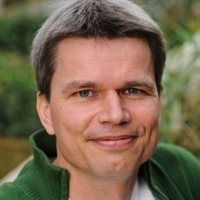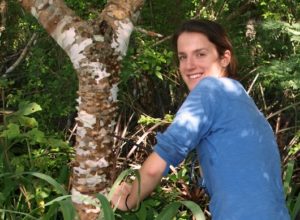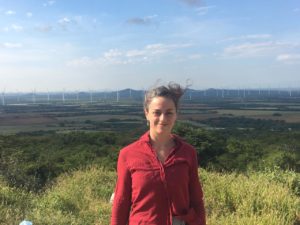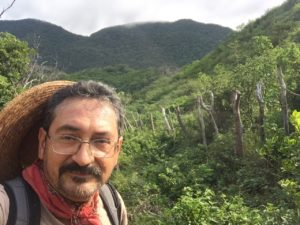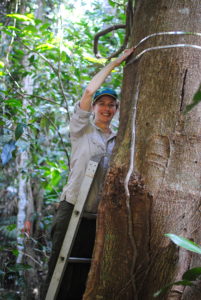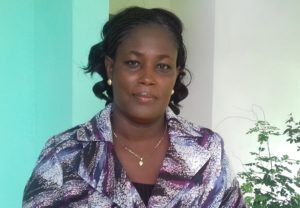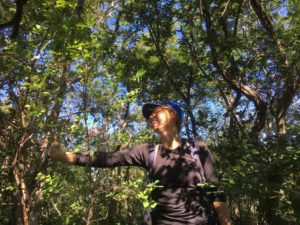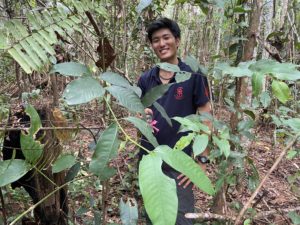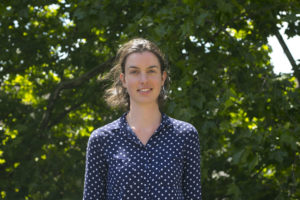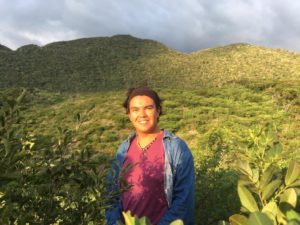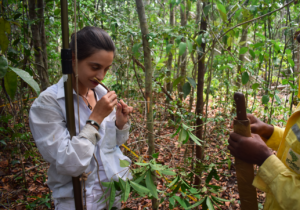Members
Lourens Poorter, full Professor in Wageningen University & Research May I introduce myself? I am a tropical biologist, with a fascination for nature, forests and people in tropical landscapes.
Research interest. The world harbours a tremendous diversity of plant species. I am fascinated how these species differ in their characteristics (traits), and how these traits shape species performance, community assembly and species coexistence. I am interested how traits scale up at the community level, determining ecosystem processes and services. Such an understanding is needed, if we want to design sustainable, multifunctional landscapes, that benefit both nature and society.
Secondary forests. During the past decade, I also work on secondary forests that regrow after land abandonment, and that play a key role in human-modified tropical landscapes. Secondary forests are fascinating to study fundamental ecological questions about succession and community assembly. At the same time they provide the basis for ecosystem restoration.
Approach. I do research by combining empirical field work, with experiments and modelling. For the past 30 years I have worked in tropical forests in Latin America, Africa, Asia, and Australia, in close collaboration with my PhD students and a large network of colleagues from all over the world.
Curriculum. I have obtained my Masters Biology at Wageningen University (1991), my PhD at Utrecht University (1998) and work since 1999 at the Forest Ecology and Management group, first as a Veni laureate, and currently as a Professor.
ERC Advanced Grant & 2ndFOR. I have received an Advanced Grant from the European Research Council for the current PANTROP project on Biodiversity and recovery of forests in tropical landscapes (2019-2025). I am coordinating together with others the 2ndFOR research network on Secondary forest succession in the tropics (www.2ndFOR.org).
Masha van der Sande, Assistant Professor in Wageningen University & Research
May I introduce myself? I am an ecologist interested in understanding the functioning of tropical forests across spatial and temporal scales.
Research focus. Tropical forests are diverse, complex, fascinating, and incredibly important for humans and many other species, both locally and globally. A better understanding of the functioning of these ecosystems will provide us the basis for effective management, conservation and restoration. My research focuses on responses of tropical tree species and forest ecosystems to disturbances, and on how plant characteristics (plant traits) modulate such responses. I do this by combining data on species and forest dynamics at short (years to decades) and long (centuries to millennia) temporal scales, and linking this with information on plant traits. My current research is based on two main projects. First, through an NWO-Veni project I assess the resilience (i.e. the ability to resist a disturbance and recover afterwards) of tropical forests to fires and droughts at decadal and millennial scales, and the role of traits in mediating this resilience. And second, I take part in the ERC-PANTROP project to assess the recovery of tropical forests after agricultural abandonment.
Curriculum. I have obtained my BSc Biology at Utrecht University (2010) and my MSc Biology (2012) and PhD degree (2016) at Wageningen University. After postdoctoral positions at the German Centre for Integrative Biodiversity Research (iDiv), the University of Amsterdam, and Florida Institute of Technology (as part of an NWO-Rubicon fellowship), I am currently employed as assistant professor at the Forest Ecology and Forest Management group of Wageningen university.
Catarina C. Jakovac, Post Doc in Wageningen University & Research
Nice to meet you! I am a Brazilian biologist specialized in plant ecology, who loves to be outdoors close to nature.
Research interest. I am most fascinated by the regeneration capacity of tropical forests and by the successional processes that reorganize plant communities over time. I started my academic path studying restoration ecology in the Atlantic Forest. Soon I thought I should better understand how forests get degraded to further understand how they could be restored. This took me to the Amazon, where I study how the intensity of previous land use history (mainly shifting cultivation and pasture) affects forest succession and the capacity of regenerating forests to restore ecosystem processes and services provided to farmers. Nowadays I am most focused on tropical forest regeneration in the Amazon and across the tropics as a restoration strategy. I evaluate the spatial distribution of secondary forests and their ecological integrity, as well as the patterns in species composition across the Neotropics. I am interested in making research with an impact on society though outreach, tools, indicators and public policies guidelines.
Approach. A mix of field-based data and modelling is the basis of the approach I currently use to evaluate and predict the regeneration capacity and integrity of tropical forests. Additionally, I use interviews with landowners, GIS and remote sensing techniques to retrieve information on land use and landscape contexts.
Curriculum. I obtained my BSc at the Universidade de São Paulo (2003), my masters at Universidade Estadual de Campinas-UNICAMP (2007) and my PhD at Wageningen University (2015). In the years between the MSc and PhD I held research scholarships at the Instituto Nacional de Pesquisas da Amazônia – INPA. Between 2017 and 2019 I joined the Instituto Internacional para Sustentabilidade/IIS-Rio as an associate researcher. I am currently a postdoc researcher under the PANTROP project at Wageningen University.
Jorge A. Meave, Senior Full Professor in National Autonomous University of Mexico
Nice to meet you! I am a trained biologist specialized in vegetation ecology. I love native vegetation of all kinds, sizes, smells and colours.
Research interest. I have always been amazed by the tremendous variation of the plant cover everywhere in the world. However, it is the tropics where I have felt the greatest fascination. Initially, I concentrated in trying to understand spatial patterns of vegetation structure and diversity, and the intricate relationships between vegetation and its environment. Gradually, and perhaps because of the long time spent in the tropical forests of southern Mexico, I became interested in forest dynamics. How stable are tropical forests? How quickly do they change? And why do they do so? Over the decades I have directly witnessed the loss of many areas of old-growth forests in Mexico, in lands that were cleared to satisfy increasing societal demands. Yet, I am convinced that we need some of these forests back, and this conviction has motivated me to focus on the study of forests recovery through secondary succession.
Approach. Although I began to study forest recovery through the chronosequence approach, I rapidly became engaged in a long-term project based on the monitoring of permanent plots in a tropical dry forest. The information gathered over almost two decades has allowed me and my students to examine forest development patterns and the underlying mechanisms, including demographic processes and the role of functional attributes of the successional species.
Curriculum. I obtained my B.Sc. (1983) and M.Sc. (1987) degrees at the Universidad Nacional Autónoma de México (UNAM), and my Ph.D. at York University in Toronto, Canada (1991). My passage through this latter programme gave me the opportunity to conduct fieldwork outside Mexico (Belize and Venezuela) for the first time. I joined the Faculty of Sciences at UNAM as an Associate Professor in 1992 and I continue to work there as a Senior Full Professor, where I serve as the Head of the Plant Ecology and Diversity Group.
2ndFOR. As a result of fruitful associations with many colleagues from numerous countries, particularly from Wageningen University in the Netherlands, I became a member of the 2ndFOR research network on secondary forest succession in the tropics (www.2ndFOR.org), of which I am a member of its Steering Committee.
Institutional website, Google Scholar profile, ResearchGate profile, Orcid ID
Susan Laurance, Professor in James Cook University, Australia
Nice to meet you! I am a tropical forest ecologist interested in the conservation of tropical diversity.
Research Interests. I study how human activities impact tropical rainforest plant and wildlife communities. I am especially interested in how vulnerable wildlife and plant species are affected by major land-use and climate change and what actions we can do to help them survive.
Secondary Forests. My interest in rainforest recovery began in 1995 when I helped organise the planting of a wildlife corridor to a fragmented national park in tropical Australia. Since then I have been fascinated by the processes that accelerate or inhibit forest recovery.
Approach. I am an ecologist. I mostly study plants, because they are the basis of the ecosystem but in my 30 years as a field biologist my research has also included mammals, birds, and insects. My research combines field surveys with experiments. My work spans much of the tropical world, including the Amazon and tropical Australia.
Curriculum: I have a BSc degree in Ecology (1990) from Qld University of Technology, a Masters in Natural Resources (1996) and PhD degree (2001) from University of New England. I was a postdoctoral fellow at Smithsonian Tropical Research Institute from (2002-2009) and an ARC Future Fellow (2013-2017). I have been an academic at James Cook University since 2010.
Lucy Amissah, Senior Research Scientist in CSIR-Forestry Research Institute of Ghana
Introduction: I am a tropical forest ecologist with interest in tropical forests and local communities’ participation in conservation and restoration of degraded landscapes.
Research interest: Tropical forests play a significant role in the livelihood strategies of the rural poor. However, the potential of the forest resources to contribute significantly to the socio-economic development of many countries in the tropics is constrained by the dwindling resource base resulting from a wide range of disturbances (e.g. logging, drought, fire and illegal mining). My research focuses on studying the impacts of these disturbances on tree distribution and plant diversity, and how the characteristics of species influence their responses to these disturbances. In addition, my past research has focused on assessing the tolerance of individual species to drought as well as their phytoremediation potential, which helps in selection of species for restoration of degraded areas. I have also conducted research on impacts of fire on farming systems and socio-economic status of farmers in forest fringe communities. I have also worked on conservation efforts including conservation of endemic species and community involvement in Forest Landscape Restoration. In the past two years, I have been keenly involved in research on the recovery of secondary forests.
Approach: I employ field assessments, experiments, and social surveys in my research. I have conducted my research predominantly in Ghana in collaboration with my colleagues in research and academia and MSc students and now collaborating with researchers abroad.
Curriculum: I obtained my BSc degree in Natural Resource Management (1997), an MPhil degree in Silviculture and Forest Management (2003), from the Kwame Nkrumah University of Science and Technology, Ghana, and a PhD degree at Wageningen University and Research with a focus on Functional Ecology. I have worked since 2003 as a Research Scientist with the Forestry Research Institute of Ghana of the Council for Scientific and Industrial Research (CSIR-FORIG), and currently work as a Senior Research Scientist at the same Institute
Jazz Kok, Phd Candidate in Wageningen University & Research
Who am I?: I am a PhD candidate at the Forest Ecology and Forest Management group in Wageningen University & Research, the Netherlands.
Background: I have an educational background in forest management and ecology, and have a Bachelor’s and Master’s degree in forest and nature conservation at the Wageningen University.
PhD topic: I focus on forest water use (i.e., how much water is transpired, how efficiently is water used for plant growth, how drought resistant is the forest) during early secondary succession in tropical forests. To understand how young regrowing forests use water, I focus on three different levels. First, I dive into water use strategies on the tree species-level and compare this between dry and wet forest. Second, I zoom out to the community-level and assess the impact of the landscape by looking at forest water use along a gradient of surrounding forest cover. Finally, I scale up into time by looking at recovery of forest water use over a period of time.
Fieldwork: I annually collect field data from a dry and wet tropical forest in Ghana, hereby doing plot-based inventories and measuring hydraulic traits of trees.
Tomonari Matsuo, Phd Candidate in Wageningen University & Research
Who am I?: I am a PhD candidate at the Forest Ecology and Forest Management group in Wageningen University & Research, the Netherlands.
Background: I have an educational background in ecology, and specialized in his Bachelor’s and Master’s degree in forest ecology. During my Bachelor and Master, I have conducted my research in the cool- and warm temperate forests in Japan and tropical wet forests in Mexico to understand how light competition among tree individuals influences forest development and species turnover.
PhD topic: My PhD research focuses on understanding the drivers of vegetation dynamics during early secondary succession in tropical forests. To understand this, I assess early vegetation dynamics by revealing four research questions: Q1) drivers of tree regeneration, Q2) light competition amongst different life forms, Q3) drivers of arrested succession and Q4) light competition among tree species.
Fieldwork: I annually collect field data from a dry and wet tropical forest in Australia, and conduct additional fieldwork in Ghana and Mexico for the sake of PANTROPical comparison to obtain the wider generalization.
Iris Hordijk, Post Doc in Wageningen University & Research
Nice to meet you! I am a forest ecologist interested in drivers of tree species abundances and implications for forest functioning.
Research focus. Forests are beautiful and fascinating ecosystems, which are essential for the current life on our planet. Specifically, I am interested in the drivers of tree species abundances, and how the composition of these species affect forest function and resilience. During my PhD research I explored these topics at a global scale, and nowadays during my postdoc I mainly work on secondary tropical forest systems.
Approach. A combination of modelling and field experiments. For the PANTROP project I collect data in Mexico, and during my studies I visited Bolivia and Ghana for field research. During my PhD research I worked with a global forest database.
Curriculum. I obtained my BSc degree in biology at the University of Utrecht (2014) and specialized in forest ecology during my MSc degree at Wageningen University (2017). In November 2021 I obtained my PhD degree at ETH Zürich. Currently, I am a postdoc researcher at the PANTROP project at Wageningen University.
Rodrigo Muñoz, Phd Candidate in Wageningen University & Research
Who am I?: I am a PhD candidate at the Forest Ecology and Forest Management group in Wageningen University & Research, the Netherlands. I am also associated to the Plant Ecology and Diversity group and to the Tropical Forest Ecology and Management group at UNAM, Mexico.
Background: I have an educational background in Biology. I specialized in forest ecology and resilience during my MSc. Most of the research I have conducted so far turns around tropical forest dynamics and its responses to disturbance.
PhD topic: My PhD project aims to assess and identify the main drivers behind drought resilience of successional tropical forests. I work with dry and wet tropical forests to determine if they are equally resilient to droughts. Since these tropical forests strikingly differ in the species they harbor, most of my project is focused in understanding how the identity of these species and their physical properties (functional traits) influence resilience to droughts.
Fieldwork: I track the dynamics of dry and wet forests in Mexico yearly to understand changes in vegetation in response to climatic variability.
Nathália Safar, Visiting researcher in Wageningen University & Research
Who am I?: I am a PhD candidate at the Universidade Federal de Viçosa, Brazil, interested in understanding the regeneration capacity of tropical forests.
Background: I have an educational background in Biology with specialization in Ecology, during my Bachelor’s, and in Botany in my Master’s. Throughout my academic career, I developed projects mainly focused on the successional patterns of tree communities, carbon stocks and soil properties in the Brazilian Atlantic forest.
PhD topic: My PhD research focuses on understanding the main drivers behind tropical Atlantic forest recovery and for that I use space-for-time substitution and trait-based approaches to assess the effects of (i) landscape context, (ii) anthropogenic disturbance and (iii) edaphic-climatic conditions on tree community assembly and function.
Fieldwork: I collected field data from old-growth and second-growth tropical Atlantic forests in Brazil.

